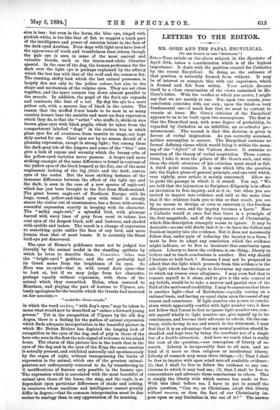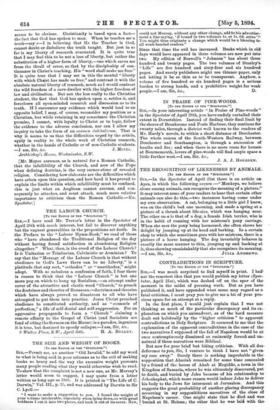LETTERS TO THE EDITOR.
MR. GORE AND THE PAPAL ENCYCLICAL.
[To THE EDITOR OF THE "SPECTATOR."] SIR,—Your article on the above subject, in the Spectator of April 28th, raises a consideration which is of the highest importance. It deals with the position created for Catholics by the recent Encyclical. In doing so, the estimate of that position is naturally formed from without. It may be of interest to compare this with our experience, which is formed and felt from within. Your article devotes itself to a close examination of. the views contained in Mr. Gore's letter. With the verdict at which you arrive, I might say that we are mainly at one. For, upon two counts, your conclusion coincides with our own ; upon the third—a very fundamental one—I much fear that we must be content to remain at issue. Mr. Gore's criticism of the Encyclical appears to us to be built upon two assumptions. The first is that the Encyclical may, with some degree of probability, be regarded by Catholics as an infallible, an ex-cathedni pro- nouncement. The second is that this decision is given in favour of verbal inspiration. As you correctly surmised, neither assumption is correct. The Encyclical contains no formal defining clause which would bring it within the mean- ing of the " definit" of the Vatican decree. It contains no assertion of the theory of verbal inspiration. These conten- tions, I take it, were the pillars of Mr. Gore's arch, and with them the whole structure of his criticism must stand or fall. A third point remains. It is one which lifts the question into the higher plane of general principle, and one with which, very rightly, your article is mainly concerned. Allow me to quote the passage in which it is stated. You say, " We are told that the injunction to Scripture diligently is in effect an invitation to free inquiry, and so it is; but when you are invited to inquire into evidence and told at the same time that if the evidence leads you to this or that result, you are by no means to divulge or even to entertain it, the freedom disappears at once, and the inquiry becomes a farce." Here a Catholic would at once feel that there is a principle of the first magnitude, and of the very essence of Christianity, which this description strangely seems to ignore. It may be desirable—no one will doubt that it is—to have the fullest and frankest inquiry into the evidence. But it does not necessarily follow that, under pain of reducing the inquiry to a farce, I must be free to adopt any conclusion which the evidence might indicate, or be free to inculcate that conclusion upon others. Liberty to know the evidence is one thing ; liberty to believe and to teach conclusions is another. But why should I hesitate or hold back ? Because I may not be prepared to admit that the light which proceeds from this evidence is the sole light which has the right to determine my convictions or to which my reason owes allegiance. I may even feel that to commit myself to it alone, and to give it the sole control of my beliefs, would be to take a narrow and partial view of the field of the motives of credibility. I may be conscious that there is another light—that of Revelation—equally resting on a rational basis, and having an equal claim upon the assent of my reason and conscience. If light number one points to conclu- sions which apparently conflict with light number two, it does not follow that I must be free to ignore light number two, com- mit myself wholly to light number one, give myself up to its conclusions, and become their advocate to others. On the con- trary, while loving to see and search to the uttermost, I may feel that it is an advantage that my mental position should be steadied and kept true by being the resultant not of a single but of a double attraction. And here we touch what is really the root of the question,—our conception of liberty of re- search. Liberty is inexpressibly dear to all men, and no kind of it more so than religious or intellectual liberty. Liberty of research may mean three things,--(l). That I shall be free to inquire with open mind into all available evidence ; (2), that I shall be free to follow the evidence to any con- clusions to which it may lead me ; (3), that I shall be free to communicate and advocate these conclusions to others. This is simply the liberty with which nature has made us free. With this ideal before me, I have to put to myself the plain question, " Can we, as Christians, adopt this liberty without reserve, or does the fact of our Christianity im- pose upon us any limitation in the use of it ?" The answer
seems to be obvious. Christianity is based upon a fact— the fact that God has spoken to man. When he teaches me a
truth—say in believing that He the Teacher is God, cannot doubt or disbelieve the truth taught. But just in so far is my liberty of research evacuated. It is quite true that I may feel this to be not a loss of liberty, but rather the substitution of a higher form of liberty,—one which saves me from the thrall of error, so that by the discipleship of con- tinuance in Christ's teaching, His "word shall make me free." It is quite true that I may see in this the mental " liberty with which Chalet has made us free," and contrast it with the absolute natural liberty of research, much as I would contrast the wild freedom of a cave-dweller with the higher freedom of law and civilisation. But not the lees really to the Christian student, the fact that God has spoken upon a, settles it, and forecloses all open-minded research and discussion as to its truth. If I encounter any evidence which would lead to an opposite belief, I may, of course, reconsider my position as a Christian, but while retaining in my conscience the Christian premise, I cannot, with loyalty to Christ or to logic, follow the evidence to the adverse conclusion, nor can I allow my inquiry to take the form of an examen dubitativum. That is why it seems to us that the difficulties urged by the article, apply in reality to the whole work of Christian research, whether in the hands of Catholic or of non-Catholic students.
—I am, Sir, &c. J. MOYES. Archbishop's House, Westminster, S. W.
[Mr. Moyes assumes, as is natural for a Roman Catholic, that the infallibility of the Church, and now of the Pope when defining doctrine, is the very corner-stone of revealed religion. Considering how elaborate are the difficulties which have arisen upon this question, and how hard it has proved to explain the limits within which infallibility must be confined, this is just what an Anglican cannot assume, and con- sequently he attaches, and must attach, much more relative importance to criticism than the Roman Catholic.—En. Spectator.]







































 Previous page
Previous page